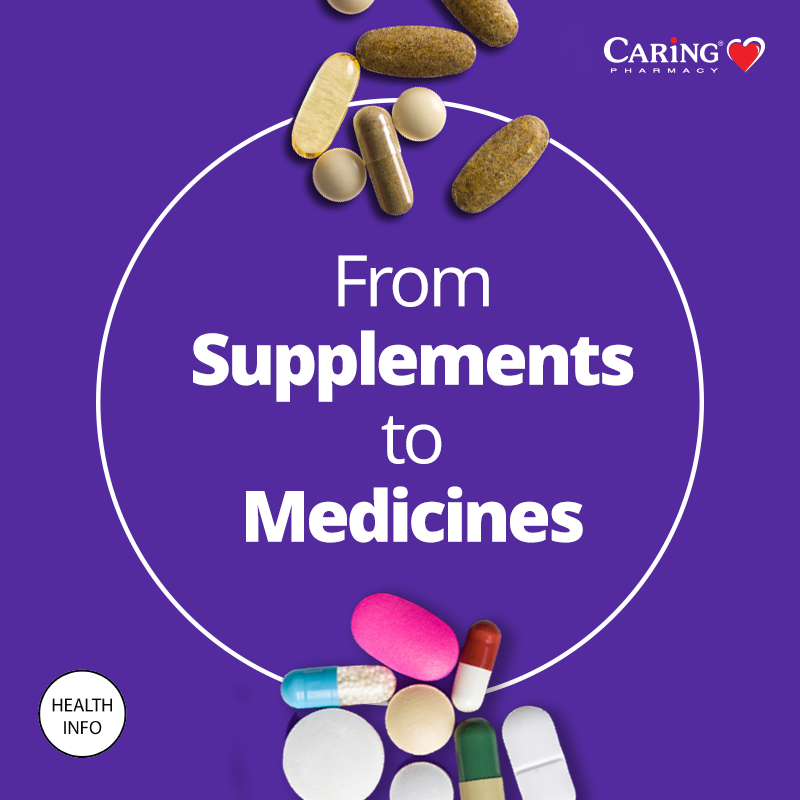- Home
- Health Center
- Health Info
- From Supplements to Medicine: Why Your Pharmacist Knows Best
From Supplements to Medicine: Why Your Pharmacist Knows Best



By LIM KELVIN
Principal Trainer, CARiNG Pharmacy
While waiting at the airport due to a delayed flight, I couldn’t help but tune in when the two individuals in front of me began discussing supplements, given my background as a pharmacist.
They were two men in their early 40’s. The loud, outspoken one on the left was telling his friend about this new supplement he just bought, and how it promises to alleviate almost all of his health concerns. When his companion suggested consulting a doctor before consuming it, the first man rebuffed the idea, saying:
“Doctors and pharmacists don’t study about herbs or vitamins one…they only know medicine. My friend went through a training course about herbs, and get certificate one. When want to buy supplements you must talk to these people, not doctors or pharmacists”
Oh my. What a statement.
While it’s accurate that many medical doctors and pharmacists might not delve deeply into alternative medicine in their primary curriculum, I firmly believe that those considering supplements should still seek advice from healthcare professionals before embarking on any new alternative treatments. Healthcare professionals are trained in the scientific method, equipping them with the ability to critically assess the efficacy and safety of products, even if they haven’t encountered them previously.
Below are a few exemplifications that differentiate trained healthcare professionals from those without formal training.
1. Consider the universally acknowledged benefits of fish oil. An untrained seller might list a myriad of advantages: it’s good for the heart, eyes, joints, blood pressure, cholesterol, and more. Consequently, anyone who thinks, “Ah, I suffer from that condition,” might be tempted to buy it on the spot, expecting their problems to go away with just this fish oil.
While there’s some truth to these claims, a pharmacist would provide more nuanced and accurate counsel.Regarding cholesterol, a pharmacist would inform you that high doses of omega-3s can decrease triglyceride levels, but have minimal impact on LDL cholesterol. They would further advise you to continue your prescribed statin medication even if you’ve started taking fish oil, as the two complement rather than substitute one another.
In the case of high blood pressure, a pharmacist will tell you that while numerous studies show blood pressure improvements with fish oil, these enhancements are relatively slight. So we probably shouldn’t be expecting a big drop in blood pressure when we take fish oils, and NEVER REPLACE our medication for high blood pressure with fish oil.
When discussing heart health, instead of a generic “Fish oil’s great for heart issues,” a knowledgeable pharmacist might caution that for specific heart conditions, like arrhythmias, there’s emerging evidence suggesting fish oils could exacerbate or increase the occurrence of such events.
In essence, an in-depth comprehension of human physiology and the ability to interpret scientific studies separate trained healthcare professionals from self-proclaimed “health gurus”.
2. Drug interactions serve as another example. Many alternative and self-taught practitioners, due to limited knowledge about conventional medicines, often offer blanket advice about combining their treatments with prescription drugs. A frequent recommendation is:
“Just take them at least 2 hours apart from your western medicine and you’ll be fine”This, however, is misleading. And at times, potentially harmful.
For instance, individuals on blood thinners like aspirin or clopidogrel have blood that clots slower to reduce the chances of vessel blockages. If these individuals consume a common supplement like Ginkgo biloba even 2 hours apart, they won’t mitigate the increased bleeding risk, since Ginkgo biloba can exacerbate the blood-thinning effect. Such individuals could then experience spontaneous bruising or bleeding from gums and the nose.
Even an 8-hour interval might not suffice since these blood thinners remain active throughout the day.
Thus, taking them a few hours apart is neither sound nor safe advice. A well-informed pharmacist would have identified this potential interaction and provided appropriate guidance.
3. A hallmark of a pharmacist is the humility to admit, “I don’t know.”
Instead of concocting answers, a pharmacist might often say,
“We lack sufficient data on this. Until further research is conducted, we genuinely can’t provide a definitive response.”
This isn’t due to a lack of knowledge, but rather stems from an earnest dedication to prioritize a patient’s welfare over any potential profit. Unlike some untrained personnel who might overstate claims to make a sale, healthcare professionals consistently prioritize their patients’ well-being.
These are but 3 examples I can think of right now, but do take a moment to appreciate the fact that pharmacists don’t just hand over medications across a counter. We act as your beacon or guiding light when you navigate the often confusing world of medicine and answer your questions, no matter how trivial.
I know, it’s easy to overlook the role we play. But every time you have a doubt about a supplement, a new medicine, or even when you just want to understand how to feel better, Just pop by and run it by your friendly neighbourhood pharmacists.
And if you happen to meet us at the end of September, celebrate World Pharmacists Day with us! We’re more than just sales people; we’re a valuable resource and ally in your healthcare journey.
Latest Health Info
HPV and You: Why Prevention Matters
What is HPV?Human papillomavirus (HPV) is one of the most common viral infections affecting both men and women. It spreads ...
Gut and Skin: How They Are Related?
Did you know that your gut and skin are connected? The gut-skin axis is the relationship between the microorganisms in ...
Ladies, Let’s Bring Out The Beauty In You
Ladies, Let’s Bring Out The Beauty In You As women juggle the demands of work, family, and personal health, taking ...



